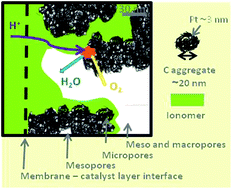HOT Review – proton conducting, hydrocarbon polymers in fuel cell catalyst layers

Perfluorosulfonic acid (PFSA) ionomer represents the state-of-the-art polymer used in both the membrane and catalyst layer to facilitate the transport of protons. However, PFSA ionomer is recognized as having significant drawbacks for large-scale commercialization.
This review highlights the role of the solid polymer electrolyte in catalyst layers on pertinent parameters associated with fuel cell performance, and focuses on the effect of replacing perfluorosulfonic acid ionomer with hydrocarbon polyelectrolytes. Collectively, this review aims to provide a better understanding of factors that have hindered the transition from PFSA to non-PFSA based catalyst layers.
Read the Energy & Environmental Science paper in full:
Hydrocarbon proton conducting polymers for fuel cell catalyst layers
Jennifer Peron, Zhiqing Shi and Steven Holdcroft
Energy Environ. Sci., 2011, DOI: 10.1039/C0EE00638F










